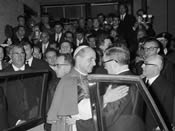The February 22 Feast of the Chair of Saint Peter is a celebration of the Church’s “unity”, and the “authority” that helps sustain it. Despite the so-called “Reformation” of the 16th century, which was essentially a rebellion against that authority (and precisely wounding that unity, resulting in the separation of many), the Church remains One, and the office of Peter is a sign (and instrument) of this unity.
The Church is human society elevated to the supernatural dimension; a reality that belongs to the order of grace and to the natural order, which are somehow parallel. Because it is human as well as God’s—in the world as well as transcending time and the material universe—whatever “goods” may be essential to the human community—“civil” society (from the Latin, civitas, “city”) or the State, the “political” community (from the Greek, polis)—would also be proper (even if, at times, only by analogy) to the Church.
Human society is, essentially, the “union of wills” (formal cause) of “individuals through their families” (material cause). It is directly brought into existence and sustained by the human drive towards association with one’s fellowmen—love—or, more properly, “solidarity” (efficient cause); and for the ultimate purpose of achieving the “common good” (final cause or “end” of society).
The “union of wills” which is the form of society can only find expression as a single will; hence, the need for a “political authority”. Parenthetically, the primary objective of the political authority—of government—is to ensure the reign of justice; and that is because “justice”, the minimum of love or solidarity, is what brings and maintains society in existence; hence, of primordial importance to the community. Justice (giving everyone his due) is the “manageable” aspect of the “efficient cause” of society; and as
Just as human society naturally requires “authority” and “law”, so does the Church, the people of God; hence, the “hierarchy” (Greek, hieros, “sacred”, and archos, “ruler”). Indeed, “grace builds on nature and brings it to fulfillment” (Pope John Paul II, Fides et Ratio, 43; paraphrasing St. Thomas Aquinas, Summa Theologiae, I, 1, 8 ad 2: “cum enim gratia non tollat naturam sed perficiat”), not the least because God assumed human nature— “the Word was made flesh, and dwelt among us” (Jn 1:14).
The institution of a “structure of government” (hierarchy) in the Church is evident from the call of the Twelve Apostles (despite their human defects), with the power and duty to appoint their successors (“succession” for “continuity”), our Bishops, as in the election of Matthias to replace Judas the Betrayer (Acts 1:15ff); and their appointment of Deacons (Acts 6:1-7). Among the Twelve, Peter (and his successor, the Pope) is clearly “first”.
Our Lord was clear about Peter’s primacy: “You are Peter and upon this rock I will build my church” (Mt 16:18). Anti-catholic propaganda would insist that the Greek words used for Peter (Petrus, stone) and the Rock (
Before the Last Supper, our Lord also singled out Peter: “Simon, Simon, behold Satan has demanded to sift all of you like wheat, but I have prayed that your own faith may not fail; and once you have turned back, you must strengthen your brothers” (Lk 22:31). After the Resurrection, our Lord again singled out Peter with the thrice-repeated commission, “Feed my sheep” (Jn 21:15-23).
Peter was aware of his primacy: he spoke for the Twelve whenever their collective stand was needed. When our Lord asked, “Who do you say I am,” Peter replied, “You are the Christ, the Son of the living God” (Mt 16:13-16; Mk 8:27-29; Lk 9:18-20). After Jesus’ Bread of Life Discourse (Jn 6:22ff), when many left because they could not accept that “unless you eat the flesh of the Son of Man, and drink his blood, you shall not have life in you” [Jn 6:54], and our Lord asked, “Do you also wish to go away,” Peter answered: “Lord, to whom shall we go? You have the words of eternal life” (Jn 6:68ff).
Peter played a leading role in the primitive Church. He directed the election of Judas’ replacement (Acts 1:15ff); he spoke to the crowd on Pentecost (2:14ff), giving his audience the requirements for their salvation (2:38, “Repent and be baptized”); he performed the first miracles of the Apostles (3:1ff). Peter’s primacy is, of course, not so much as “master” but as servant—“servant of the servants of God,” servus servorum Dei.
From the beginning, the Church was also aware of Peter’s primacy. While Peter was in prison (at Herod’s orders) in
It was Peter’s boat (also an image of the Church) that our Lord chose, from which he taught the crowds (Lk 5:3). Like Noah’s
St. Josemaria writes: “Catholic, apostolic, Roman! I want you to be very Roman, ever anxious to make your ‘pilgrimage’ to
O.C.P.A.J.P.M.








